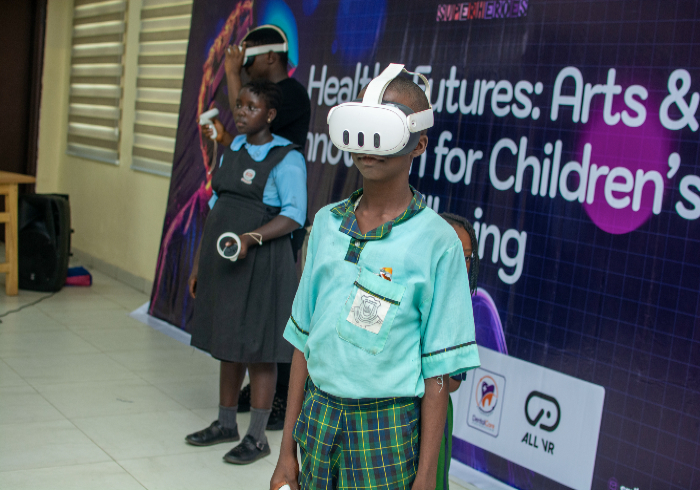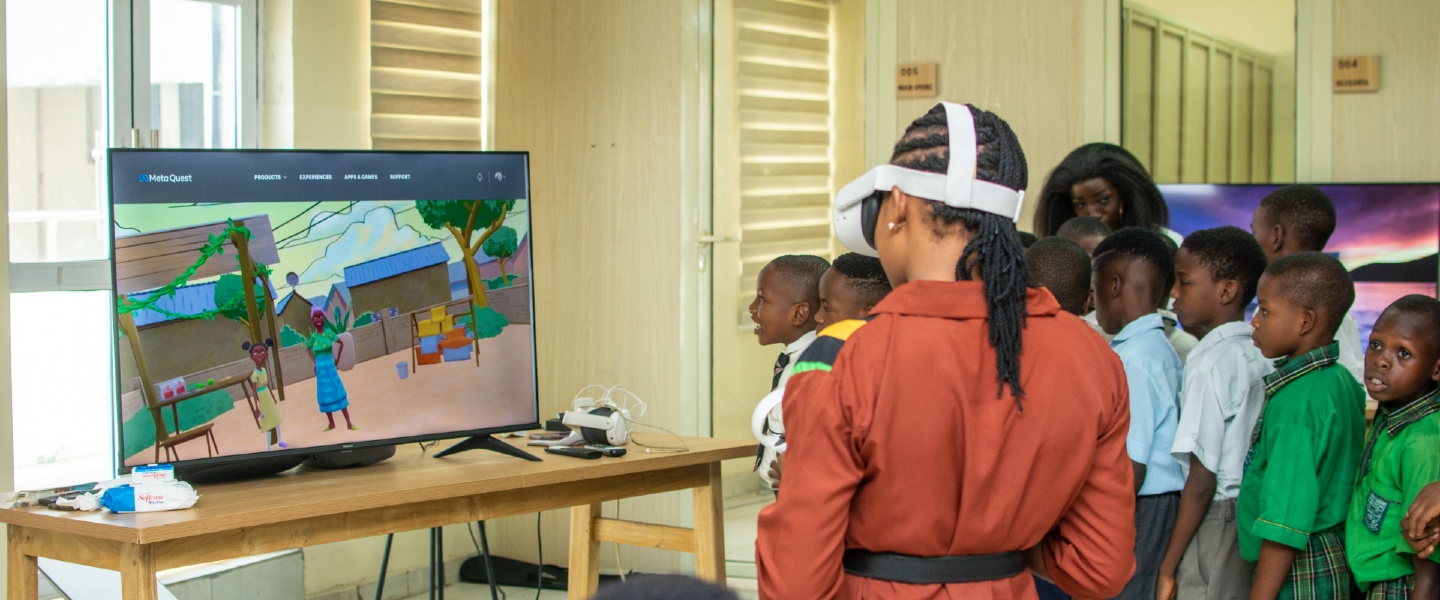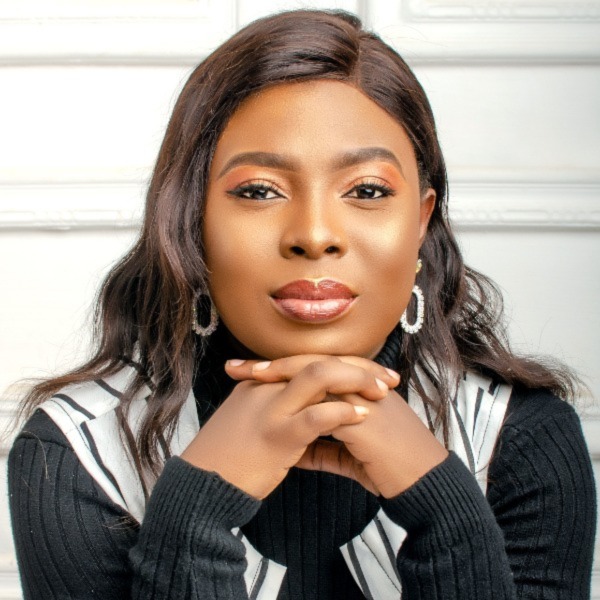If someone had told me years ago that my work as a rural dentist would lead to the creation of multilingual storybooks, international health youth clubs, and a virtual reality oral health experience, I probably would have laughed. But here we are. Ordinarily, when people think of dentists, they don’t imagine books, stories, or virtual reality. They see dental chairs. But that’s the power of thinking beyond borders and beyond boxes. That’s the kind of perspective that the Atlantic Fellows community brings: a space where you’re not just allowed, but encouraged, to dream wildly, collaborate deeply and act boldly.
In many low-resource communities, health awareness often arrives in the same familiar way: leaflets handed out at busy junctions, a loudspeaker blaring advice from the back of a van, or a quick talk at the town square. It’s what we’ve always done. And yes, it has its place. But let’s be honest, how many people truly remember what was said? How many feel moved to act?
The truth is, these methods often fall flat. Not because people don’t care, but because the approach is passive. It talks at people, not with them. It assumes everyone can read, that they have time to stop and listen, or even that the message feels relevant to their lives.
But in a world where people are already carrying so much weight from poverty, poor infrastructure and daily survival, messages need to do more than inform. They need to connect. And connection doesn’t happen through noise; it happens through story, empathy and meaningful engagement. That’s where real change begins.
That’s why I knew we had to do things differently.
I didn’t want to just raise awareness, I wanted to spark something. Something that would stick. That would linger in the hearts of children long after the posters had faded or the loudspeakers had gone quiet.
That’s what led me to write “The Girl Who Found Her Smile.” I wanted to meet children where they truly are not just physically, but emotionally. To speak to them in a way that felt personal, relatable, and real.
The story was born out of my personal experience and many encounters I’d had during my dental outreaches in rural communities. I remember one girl in particular — she barely spoke and barely smiled. Her pain was written all over her face, but so was something else: potential. I never forgot her. And from that memory, Anita was born.
What I didn’t expect was how far her story would go.
Through a beautiful twist of connection,“The Girl Who Found Her Smile” became the unlikely bridge between children in Nigeria and the Philippines. With support from the Atlantic Institute during the COVID-19 pandemic, I launched a children’s comic book promoting dental hygiene, specifically aimed at young schoolchildren in underserved communities in Nigeria. I later partnered with fellow Atlantic Fellow Alfredo Coro from the Philippines to translate the book into multiple languages, broadening its impact across diverse regions. Two different worlds, united by one simple but powerful idea: every child deserves to be seen, to be healthy and to smile with pride.
And that’s where the real magic began.
When I first heard about virtual reality, it honestly sounded strange to me, like something far removed from the realities of rural life. But the day I experienced it for myself, something shifted. The light bulb went on. This wasn’t just about technology, it was about possibility. I thought, What if a child could step into Anita’s world, not just read about it? What if they could feel her fear, her hope and her transformation firsthand? That’s when I knew VR could be a game changer. With the community support of Atlantic Institute XR (Extended Reality) Lab, we began reimagining the book as a fully immersive experience. It wasn’t just innovation for innovation’s sake, it was a bold step toward health equity, using technology to bring empathy, understanding and health education to children who are so often left behind.
Virtual reality is often viewed as a luxury or a tool reserved for gamers and wealthy institutions. But I listened to Alice Wroe, the Atlantic Institute XR Lead, articulate why it is important for technology to be harnessed by people wanting to achieve common good and fairness. VR becomes a bridge, one that can carry rural children from their current limitations to global opportunities.
VR doesn’t just show you health risks; it makes you feel them. In a setting where health is often abstract or mythologized, emotional connection is key. When a child “feels” what it means to lose a tooth from decay, or when a mother “witnesses” the impact of poor nutrition on a virtual child, education becomes personal.
Everyone deserves access to high quality health education. VR allows us to bring world-class, scientifically accurate, culturally adapted education to places such resources don’t usually reach. It’s like building a clinic without walls, scalable, portable and borderless.
While some may argue that VR is too advanced for rural settings, I believe the opposite is true. When paired with simple, relatable stories in books, VR doesn’t replace traditional learning, it enhances it. A child reads the book, understands the story, and then steps into that world to deepen their comprehension.
During one of our recent VR pilot sessions, I learned something I wasn’t expecting. As one child took off the headset, he looked up at me and said, “I want to be a dentist one day.” And in that moment, it hit me: beyond health education, one of the most powerful gifts we were offering was aspiration. When rural children experience cutting-edge technology, they’re not just learning about teeth or hygiene, they are also catching a glimpse of what’s possible. They can start to see themselves as future doctors, creators and innovators. The VR experience told them, you matter enough to have access to this. And that changes everything.
The long-term impact of giving rural children access to powerful stories and immersive experiences is something I’ve come to deeply believe is not just important but life-changing.
The truth is, rural children are often the last to be seen, the last to be heard, and the last to be reached. My experience shows that the children I have met aren’t lacking in brilliance or imagination, they are full of it. What they don’t have is ready access. Give them books in their language, technology that invites them in, and stories that look and sound like their own lives and you’ll be amazed at what they do with it.
Find out more about the VR film here.







.png)

